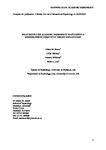What motivates academic dishonesty in students? A Reinforcement Sensitivity Theory explanation.
| dc.contributor.author | Bacon, Alison | |
| dc.contributor.author | McDaid, C | |
| dc.contributor.author | Williams, N | |
| dc.contributor.author | Corr, PJ | |
| dc.date.accessioned | 2019-01-21T14:47:36Z | |
| dc.date.issued | 2019-02-11 | |
| dc.identifier.issn | 0007-0998 | |
| dc.identifier.issn | 2044-8279 | |
| dc.identifier.uri | http://hdl.handle.net/10026.1/13195 | |
| dc.description | Publisher’s embargo period: Embargo set on 04.03.2019 by SR (TIS). | |
| dc.description.abstract |
<jats:sec><jats:title>Background</jats:title><jats:p>Academic dishonesty (<jats:styled-content style="fixed-case">AD</jats:styled-content>) is an increasing challenge for universities worldwide. The rise of the Internet has further increased opportunities for students to cheat.</jats:p></jats:sec><jats:sec><jats:title>Aims</jats:title><jats:p>In this study, we investigate the role of personality traits defined within Reinforcement Sensitivity Theory (<jats:styled-content style="fixed-case">RST</jats:styled-content>) as potential determinants of <jats:styled-content style="fixed-case">AD</jats:styled-content>. <jats:styled-content style="fixed-case">RST</jats:styled-content> defines behaviour as resulting from approach (Reward Interest/reactivity, goal‐drive, and Impulsivity) and avoidance (behavioural inhibition and Fight–Flight–Freeze) motivations. We further consider the role of deep, surface, or achieving study motivations in mediating/moderating the relationship between personality and <jats:styled-content style="fixed-case">AD</jats:styled-content>.</jats:p></jats:sec><jats:sec><jats:title>Sample</jats:title><jats:p>A sample of <jats:styled-content style="fixed-case">UK</jats:styled-content> undergraduates (<jats:italic>N</jats:italic> = 240).</jats:p></jats:sec><jats:sec><jats:title>Method</jats:title><jats:p>All participants completed the <jats:styled-content style="fixed-case">RST</jats:styled-content> Personality Questionnaire, a short‐form version of the study process questionnaire and a measure of engagement in <jats:styled-content style="fixed-case">AD</jats:styled-content>, its perceived prevalence, and seriousness.</jats:p></jats:sec><jats:sec><jats:title>Results</jats:title><jats:p>Results showed that <jats:styled-content style="fixed-case">RST</jats:styled-content> traits account for additional variance in <jats:styled-content style="fixed-case">AD</jats:styled-content>. Mediation analysis suggested that <jats:styled-content style="fixed-case">GDP</jats:styled-content> predicted dishonesty indirectly via a surface study approach while the indirect effect via deep study processes suggested dishonesty was not likely. Likelihood of engagement in <jats:styled-content style="fixed-case">AD</jats:styled-content> was positively associated with personality traits reflecting Impulsivity and Fight–Flight–Freeze behaviours. Surface study motivation moderated the Impulsivity effect and achieving motivation the <jats:styled-content style="fixed-case">FFFS</jats:styled-content> effect such that cheating was even more likely when high levels of these processes were used.</jats:p></jats:sec><jats:sec><jats:title>Conclusions</jats:title><jats:p>The findings suggest that motivational personality traits defined within <jats:styled-content style="fixed-case">RST</jats:styled-content> can explain variance in the likelihood of engaging in dishonest academic behaviours.</jats:p></jats:sec> | |
| dc.format.extent | 152-166 | |
| dc.format.medium | Print-Electronic | |
| dc.language | en | |
| dc.language.iso | en | |
| dc.publisher | Wiley | |
| dc.subject | academic dishonesty | |
| dc.subject | cheating | |
| dc.subject | deep learning | |
| dc.subject | reinforcement sensitivity theory | |
| dc.subject | student | |
| dc.subject | surface learning | |
| dc.title | What motivates academic dishonesty in students? A Reinforcement Sensitivity Theory explanation. | |
| dc.type | journal-article | |
| dc.type | Journal Article | |
| plymouth.author-url | https://www.webofscience.com/api/gateway?GWVersion=2&SrcApp=PARTNER_APP&SrcAuth=LinksAMR&KeyUT=WOS:000516573600009&DestLinkType=FullRecord&DestApp=ALL_WOS&UsrCustomerID=11bb513d99f797142bcfeffcc58ea008 | |
| plymouth.issue | 1 | |
| plymouth.volume | 90 | |
| plymouth.publication-status | Published | |
| plymouth.journal | British Journal of Educational Psychology | |
| dc.identifier.doi | 10.1111/bjep.12269 | |
| plymouth.organisational-group | /Plymouth | |
| plymouth.organisational-group | /Plymouth/Faculty of Health | |
| plymouth.organisational-group | /Plymouth/Faculty of Health/School of Psychology | |
| plymouth.organisational-group | /Plymouth/REF 2021 Researchers by UoA | |
| plymouth.organisational-group | /Plymouth/REF 2021 Researchers by UoA/UoA04 Psychology, Psychiatry and Neuroscience | |
| plymouth.organisational-group | /Plymouth/REF 2021 Researchers by UoA/UoA04 Psychology, Psychiatry and Neuroscience/UoA04 REF peer reviewers | |
| plymouth.organisational-group | /Plymouth/Research Groups | |
| plymouth.organisational-group | /Plymouth/Research Groups/Centre for Brain, Cognition and Behaviour (CBCB) | |
| plymouth.organisational-group | /Plymouth/Research Groups/Centre for Brain, Cognition and Behaviour (CBCB)/Behaviour | |
| plymouth.organisational-group | /Plymouth/Research Groups/Plymouth Institute of Health and Care Research (PIHR) | |
| plymouth.organisational-group | /Plymouth/Users by role | |
| plymouth.organisational-group | /Plymouth/Users by role/Academics | |
| dc.publisher.place | England | |
| dcterms.dateAccepted | 2019-01-21 | |
| dc.rights.embargodate | 2020-2-11 | |
| dc.identifier.eissn | 2044-8279 | |
| dc.rights.embargoperiod | Not known | |
| rioxxterms.versionofrecord | 10.1111/bjep.12269 | |
| rioxxterms.licenseref.uri | http://www.rioxx.net/licenses/all-rights-reserved | |
| rioxxterms.licenseref.startdate | 2019-02-11 | |
| rioxxterms.type | Journal Article/Review |


